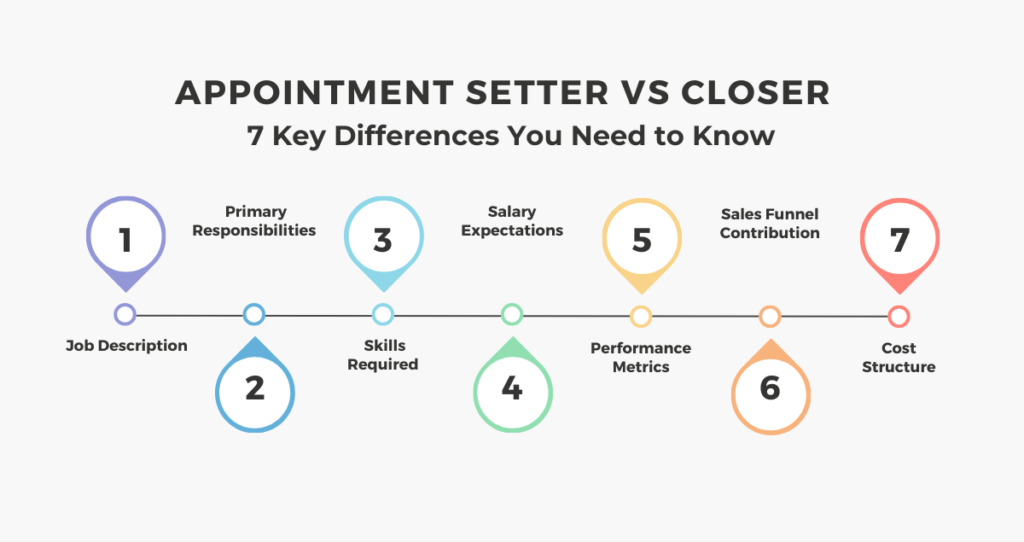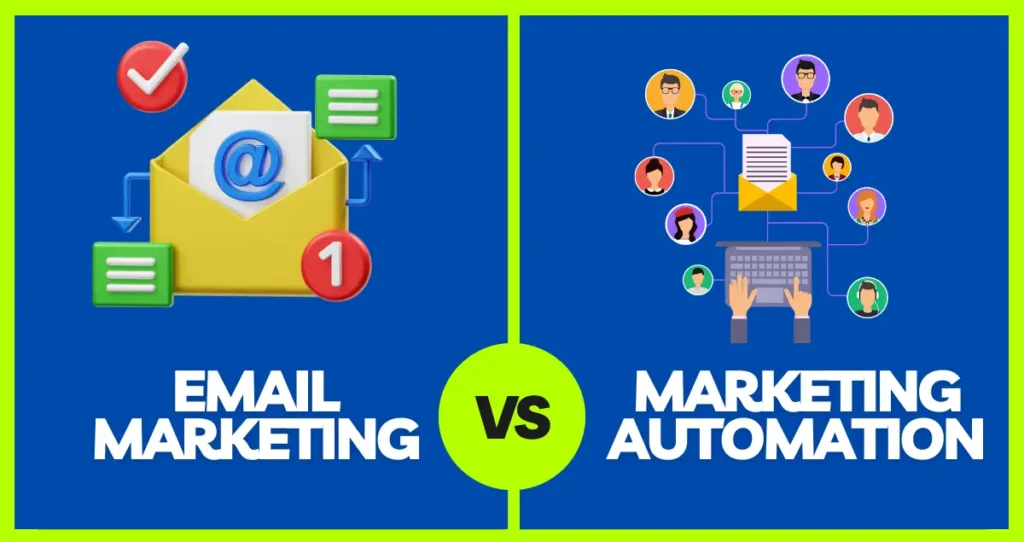Appointment setters work on finding leads and setting up meetings, making sure the sales team always has opportunities. Closers, however, focus on discussing details and closing deals, turning interested people into real customers.

What is an Appointment Setter?
An appointment setter is a sales professional focused on lead generation and scheduling meetings with potential clients. This role is crucial in the early stages of the sales process, as they establish the first contact with prospects and begin the qualification process. By setting up appointments, appointment setters create the necessary opportunities for the sales team to engage and ultimately close deals.
Key Responsibilities of Appointment Setters
- Lead Generation: Appointment setters actively seek out potential clients by using a range of methods such as cold calling, email outreach, and social media campaigns. They identify decision-makers and nurture initial interest.
- Qualifying Leads: Appointment setters ask qualifying questions to assess whether the lead is a good fit for the product or service. This ensures the sales team focuses on high-potential prospects.
- Scheduling Appointments: Once a lead is qualified, the appointment setter schedules meetings between the potential client and a sales representative, ensuring that both parties are prepared for the discussion.
Example: A software company might employ appointment setters to contact IT managers and schedule product demo meetings with the sales team. The appointment setter’s job is to set the stage for a successful sales conversation.
Looking for Media Placement? Here are Top 10 Media Buying Platforms
Skills Required for Appointment Setters
- Excellent Communication: Since they make the first impression, appointment setters must have clear and persuasive verbal and written communication skills.
- Organization: They need to manage multiple leads, set appointments efficiently, and stay on top of follow-ups.
- CRM Proficiency: Appointment setters often rely on customer relationship management (CRM) tools to track leads and manage scheduling.
Quick Note: 25 Appointment Setter Skills You Should Learn
Appointment Setter vs Closer: The Core Differences
- Focus on Initial Contact: Appointment setters are primarily focused on the early stages of the sales funnel, handling the initial outreach and scheduling. In contrast, closers take over later in the process to finalize sales.
- Skills and Expertise: Appointment setters excel at managing communication and scheduling, while closers require in-depth product knowledge, negotiation skills, and the ability to overcome objections.
Impact on Sales
Appointment setters lay the foundation for a robust sales pipeline by generating qualified leads. According to a study by Forrester Research, businesses that excel at lead nurturing can generate 50% more sales-ready leads at 33% lower costs. Appointment setters improve efficiency by allowing sales teams to focus on converting prospects into clients.
How to Close Leads? Here is Automated Client Conversion Using GoHighLevel Transform Your Sales
What is a Closer?
A closer is a sales professional who specializes in converting prospects into paying customers. Their primary role is to seal the deal by addressing objections, negotiating terms, and guiding the client through the final stages of the sales process.
Key Responsibilities of Closers
- Conducting In-Depth Discussions: Closers engage with prospects in detailed conversations, uncovering their needs and offering tailored solutions. They present product features, benefits, and answer any questions the prospect may have.
- Negotiating Terms: Closers often negotiate pricing, contract terms, and other key factors to arrive at a mutually beneficial agreement between the company and the prospect.
- Finalizing the Sale: Closers are responsible for guiding prospects through the final steps of the sales process, ensuring that all paperwork is completed, and the deal is officially closed.
Example: In the real estate industry, a closer will meet with potential buyers, showcase suitable properties, negotiate the price, and finalize the sale agreement.
Skills Required for Closers
- Negotiation Skills: Closers must be skilled negotiators, able to navigate complex discussions and find common ground that satisfies both the client and the company.
- Product Knowledge: A deep understanding of the product or service being sold is essential for answering questions, addressing concerns, and demonstrating value.
- Objection Handling: Closers must anticipate and address any objections that arise during the sales process to prevent prospects from walking away.
Impact on Sales
The role of a closer directly impacts revenue. According to CSO Insights, companies that implement sales enablement strategies see a win rate of 49% for forecast deals, compared to 42.5% for companies without sales enablement. A skilled closer boosts revenue by converting leads into actual sales.
Key Differences Between Appointment Setters and Closers
Understanding the unique strengths and responsibilities of each role will help you optimize your sales team. Let’s take a closer look at the primary differences between appointment setters and closers.
1. Job Description
- Appointment Setter: Responsible for generating leads and scheduling meetings. They focus on the early stages of the sales process, qualifying leads and passing them on to closers.
- Closer: Specializes in the final stages of the sales process, from negotiating terms to finalizing the deal.
2. Primary Responsibilities
- Appointment Setter:
- Lead generation
- Qualifying leads
- Scheduling meetings
- Closer:
- Conducting in-depth discussions
- Negotiating terms and pricing
- Finalizing sales
3. Skills Required
- Appointment Setter:
- Excellent communication
- Organizational skills
- CRM proficiency
- Closer:
- Strong negotiation skills
- In-depth product knowledge
- Objection-handling expertise
A Complete Guide: Run Ads Automatically on GoHighLevel Using Uphex
4. Salary Expectations
- Appointment Setter: Typically earn a lower base salary with performance-based bonuses or incentives based on the number of meetings scheduled.
- Closer: Generally receive a higher base salary, complemented by commissions on closed deals, reflecting the more significant impact they have on revenue.
5. Performance Metrics
- Appointment Setter: Performance is evaluated based on the number of appointments set and the quality of leads generated.
- Closer: Evaluated on the number of deals closed and the revenue generated from those deals.
6. Sales Funnel Contribution
- Appointment Setter: Works at the top of the sales funnel, generating and qualifying leads.
- Closer: Operates at the bottom of the sales funnel, ensuring that leads are successfully converted into customers.
7. Cost Structure
- Appointment Setter: Lower base salaries with bonuses or incentives tied to performance. Virtual appointment setters, often working remotely, may have lower associated costs.
- Closer: Higher base salaries with significant commissions for closed deals, reflecting the high stakes and rewards of the closing process.
Easy Guide: 10 Steps to Become a Blogging Virtual Assistant
Which Role Does Your Sales Team Need?
Deciding whether to hire an appointment setter or a closer depends on the specific needs of your business. Here’s how to choose the right role for your team:
If You Need Lead Generation
If your primary focus is on building a pipeline of prospects, an appointment setter is essential. Appointment setters excel at identifying, qualifying, and scheduling meetings with potential clients, ensuring that your sales team has a steady stream of qualified leads to engage with.
Also Read: Boost Engagement with Gohighlevel Social Planner
If You Need to Close Deals
If your sales pipeline is already filled with promising leads, and you need someone to finalize the deals, a closer is the right choice. Closers specialize in converting leads into customers by negotiating terms, addressing objections, and guiding the process to a successful close.
If You Need Both
For many businesses, having both roles can provide the best results. By combining the strengths of appointment setters and closers, your sales team can ensure that leads are not only generated but also effectively converted into sales. This allows you to maximize efficiency and revenue potential across the entire sales process.
Example: A tech startup might use appointment setters to contact potential clients and set up demo appointments, while their closers focus on negotiating contracts and closing the deals.
Conclusion
Both appointment setters and closers play vital, yet distinct roles in the sales process. Appointment setters excel at generating and qualifying leads, while closers specialize in negotiating terms and finalizing deals. By understanding the differences between these two roles, you can tailor your sales strategy to ensure that each stage of your pipeline is efficiently managed, helping your team close more deals and increase revenue.
Whether you need to fill the pipeline or close the deal, the right sales professionals in each role can be the key to growing your business. Make sure to evaluate your team’s needs carefully and hire accordingly to maximize your sales success.







